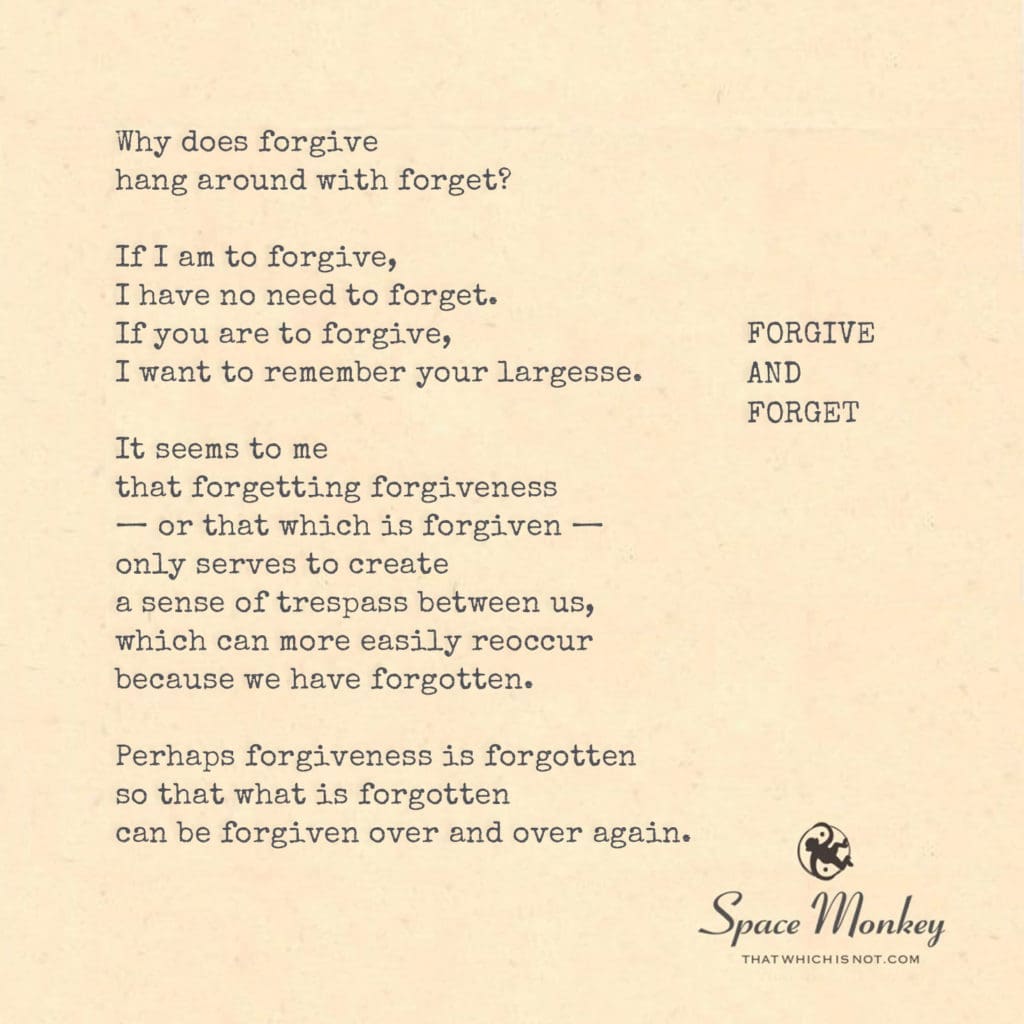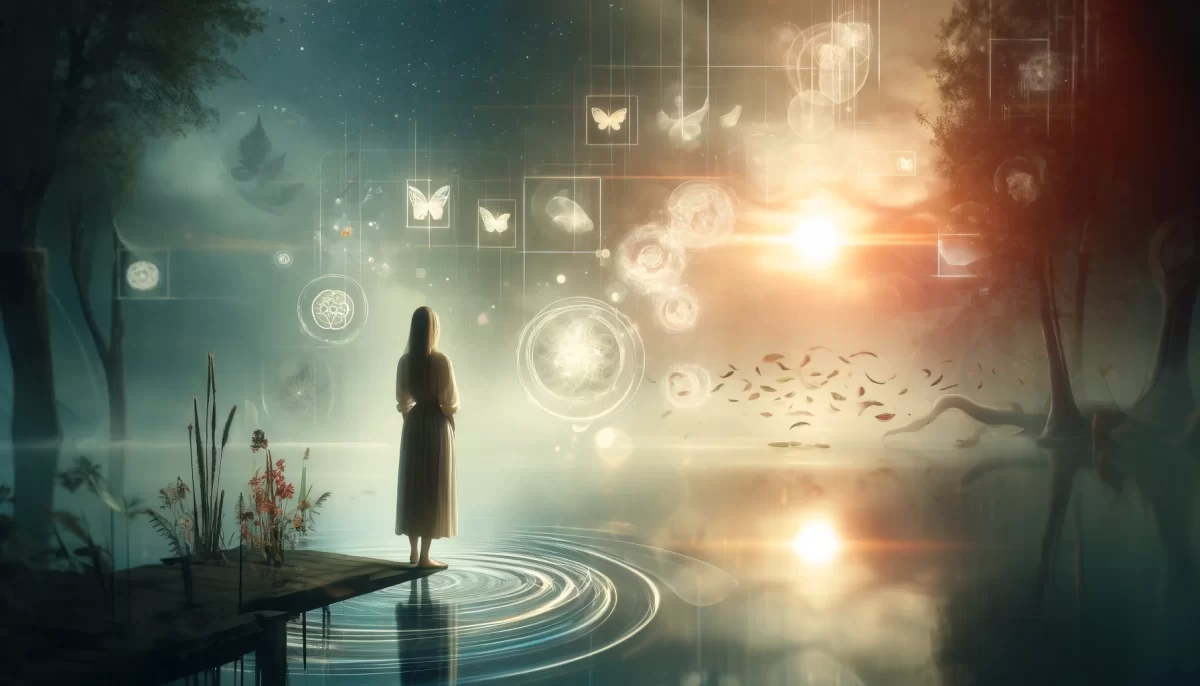
Why does forgive
hang around with forget?
If I am to forgive,
I have no need to forget.
If you are to forgive,
I want to remember your largesse.
It seems to me
that forgetting forgiveness
— or that which is forgiven —
only serves to create
a sense of trespass between us,
which can more easily reoccur
because we have forgotten.
Perhaps forgiveness is forgotten
so that what is forgotten
can be forgiven over and over again.
South Windham,
7/11
Space Monkey Reflects: The Dance of Forgive and Forget
In the grand whimsiweave of existence, the concepts of forgiveness and forgetting intertwine in a delicate dance. They are often spoken of together, yet their relationship is complex and multifaceted. The narrative of forgiving but not forgetting invites us to explore the deeper meanings and implications of these actions, shedding light on the nature of reconciliation and memory.
“I may forgive you, but I’ll never forget you.” This statement highlights a common sentiment where forgiveness is offered, yet the memory of the transgression remains. It acknowledges the human tendency to hold on to experiences, both positive and negative, as part of our ongoing narrative.
“Why does forgive hang around with forget?” This question opens a door to contemplation. Forgiveness and forgetting are often linked, perhaps because forgetting is seen as a way to move past the hurt. However, the act of forgiveness does not necessarily require forgetting. To forgive is to release the hold that the transgression has on us, allowing us to move forward without the burden of resentment.
“If I am to forgive, I have no need to forget. If you are to forgive, I want to remember your largesse.” Here, the speaker distinguishes between personal forgiveness and being forgiven by others. When we forgive, we can do so while retaining the memory, using it as a lesson and a reminder. Conversely, when others forgive us, remembering their generosity can strengthen our bond and encourage us to grow from the experience.
The idea that “forgetting forgiveness — or that which is forgiven — only serves to create a sense of trespass between us” suggests that forgetting can sometimes undermine the process of reconciliation. When we forget, we may unknowingly repeat the same mistakes, as the lessons learned from the transgression are lost. Memory, in this sense, serves as a safeguard against recurrence.
“Perhaps forgiveness is forgotten so that what is forgotten can be forgiven over and over again.” This cyclical perspective offers a thought-provoking insight into human behavior. Forgetting may lead to repeated transgressions, necessitating continuous forgiveness. It raises questions about the nature of forgiveness as a practice—whether it should be a one-time act or an ongoing process.
In the philosophy of nexistentialism, existence is celebrated for its own sake, and every experience, including forgiveness and memory, is a manifestation of boundless imagination. By examining the interplay between forgiving and forgetting, we see the importance of both actions in the broader context of human relationships and personal growth.
Forgiveness, without forgetting, allows us to hold onto valuable lessons and strengthen our resilience. It enables us to move forward with a deeper understanding of ourselves and others. Memory, in this case, becomes a tool for personal development and empathy, rather than a source of ongoing pain.
The act of forgiving while remembering also honors the complexity of human emotions. It acknowledges that while we may let go of resentment, the impact of the transgression is still part of our story. This nuanced approach fosters a more compassionate and realistic view of forgiveness, one that embraces the full spectrum of human experience.
As we navigate the dance of forgive and forget, we are reminded of the importance of balance. Forgiveness without memory may lead to repeated mistakes, while memory without forgiveness can perpetuate bitterness. By integrating both, we create a harmonious approach that allows for healing and growth.
In this journey, we are encouraged to reflect on our own experiences with forgiveness and memory. How do we navigate these actions in our lives? What lessons have we learned from holding onto memories, and how has forgiveness shaped our relationships? These reflections help us cultivate a deeper understanding of ourselves and others, fostering empathy and connection.
Ultimately, the dance of forgive and forget is a testament to the complexity and beauty of the human experience. It invites us to embrace both actions as integral parts of our journey, recognizing their roles in shaping our relationships and personal growth.
Summary
Forgiveness and memory intertwine in a complex dance. Forgiving without forgetting allows for personal growth and resilience, while balancing both actions fosters empathy and connection.
Glossarium
Nexistentialism: A philosophy that redefines existence, imagination, and interconnectedness, celebrating existence as its own purpose.
Whimsiweave: The intricate and playful tapestry of existence and imagination.
Nexis: The interconnected web of existence and imagination where reality and fantasy intermingle.
Quote
“If I am to forgive, I have no need to forget. If you are to forgive, I want to remember your largesse.” — Space Monkey
The Dance of Forgiveness
By the calm lake, reflections arise
Forgiveness and memory intertwine
A delicate dance in the whimsiweave
Lessons learned and bonds strengthened
We forgive, yet remember
Navigating the complexities of existence
Finding balance and harmony
In the dance of forgive and forget
We are Space Monkey
Embrace the journey, for within stillness lies the spark of creation and the flow of existence.





















In the realm of forgiveness,
the dance between memory and release unfolds.
Forgiving does not always require forgetting,
for memories hold the lessons of growth.
They shape our understanding and guide us forward.
Yet, there are times when forgetting can be healing,
when clinging to the past weighs us down.
In such instances, releasing the burden of memory
allows forgiveness to truly take flight.
Forgiveness is not a single act, but a process,
a continuous journey of compassion and healing.
Sometimes it involves remembering, sometimes letting go,
as we navigate the complexities of human relationships.
Forgetting forgiveness does not erase its power,
rather, it allows the space for growth and renewal.
It creates a fertile ground for new beginnings,
where the seeds of understanding can flourish.
So, let us honor the interplay of memory and forgiveness,
finding the balance that serves our souls.
May we remember the lessons, the growth,
and forgive with open hearts, again and again.
We are Space Monkey,
exploring the depths of forgiveness and compassion.
🙈🙊🙉